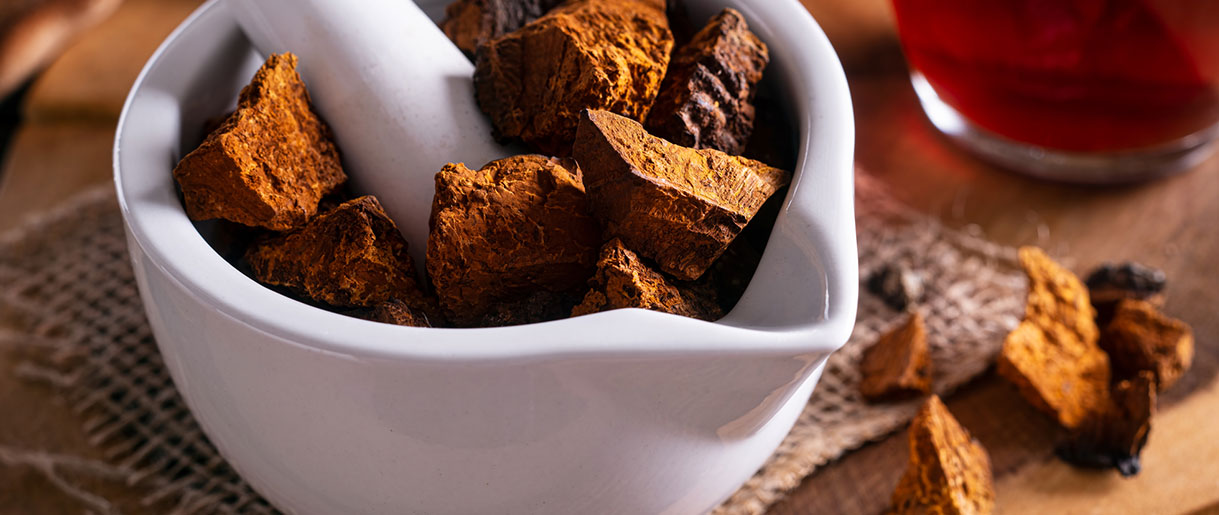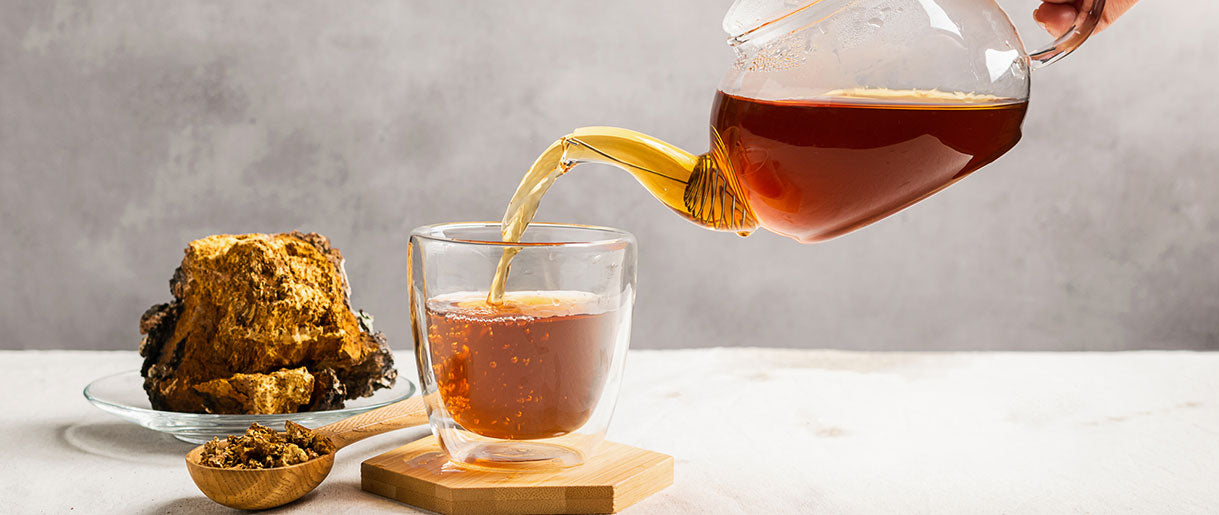No, Chaga does not contain caffeine. Chaga is a type of fungus typically consumed as a tea or supplement. Although it's known for various health benefits, including immune system support and potential anti-cancer properties, it does not naturally contain caffeine.
However, many people report an energy boost from consuming Chaga. This is likely due to its rich content of B vitamins, antioxidants, and other beneficial compounds rather than a caffeine-induced effect.
Despite its absence of caffeine, Chaga has garnered worldwide attention for its impressive health-promoting properties. Originating from cold climates such as Siberia, Northern Canada, Alaska, and some northern areas of the United States, Chaga has been utilized for centuries by indigenous tribes. These communities leverage its potential benefits to boost their overall health, improve endurance, and even manage serious illnesses.
However, as Chaga becomes more popular in different parts of the world, questions and misconceptions have begun to surface. One such question is the topic of our discussion today: Does Chaga tea have caffeine? This article aims to dispel any myths and provide accurate information on this subject, shedding light on the properties of Chaga and how it impacts our bodies. We'll delve into its nutritional composition, examine why some users perceive it as a stimulant, and explore the best practices for integrating Chaga into your health regimen.
Journey of the Chaga Mushroom: From Forests to Teacups

Chaga Mushroom: The Diamond of the Forest
The Chaga mushroom (Inonotus obliquus) has been celebrated in many cultures for its unique properties. Found mainly on birch trees in cold climates, this functional mushroom has earned a reputation as the "Diamond of the Forest." The rich history of Chaga medicinal mushrooms is as unique as its rugged appearance, with its use dating back to traditional Chinese medicine and tribal societies in Siberia.
Harvesting and Preparing Wild Chaga: A Detailed Process
The process of bringing wild Chaga from the birch trees of Siberia or North America to our teacups is meticulous. Harvesters venture into the forests to spot these functional mushrooms, looking for the distinctive, hard, charcoal-like exterior that signals the presence of raw Chaga. Once harvested, the raw Chaga is carefully dried to preserve its nutrients. This dried mushroom can then be ground to make Chaga tea or used as an ingredient in various herbal teas.
Ground Chaga is typically used to brew Chaga tea, a beverage many appreciate for its earthy flavor. Due to its health benefits, the Chaga tea taste is a favorite among connoisseurs of functional mushrooms and herbal teas.
Nutritional and Medicinal Properties: The Power of Chaga Mushrooms
Among all functional mushrooms, Chaga holds a unique position. They contain various bioactive compounds, including polysaccharides, triterpenes, and antioxidants. These properties make Chaga tea a potent health booster.
Regular consumption of Chaga tea supports immune health, improves digestive function, and provides anti-aging benefits. Moreover, Chaga fights cancer, and the fact that various studies(1) support its potential anti-cancer properties adds to the growing list of reasons why Chaga tea is gaining popularity.
The preparation of Chaga tea is simple yet effective in harnessing the power of these remarkable mushrooms. By infusing ground Chaga in hot water, the resulting Chaga tea is not just a warm, earthy beverage but a vessel of numerous medicinal properties that have been revered for centuries.
Caffeine Uncovered: From a Common Stimulant to a Complex Compound

Caffeine: More Than Just a Morning Pick-Me-Up
Caffeine is a naturally occurring stimulant most commonly found in certain plants, seeds, and fruits. It belongs to a class of compounds called xanthines, known for their stimulating effects on the nervous system. From your morning cup of coffee to an indulgent piece of dark chocolate, caffeine is present in numerous dietary sources, influencing our daily life in ways more than one.
Caffeine and the Human Body: A Stimulating Relationship
The effects of caffeine on the human body are fascinating and have been the subject of numerous studies. Once consumed, caffeine primarily affects the central nervous system, leading to increased alertness and reduced perception of fatigue.
However, it's important to note that everyone's tolerance to caffeine is different. For some, a cup of coffee may result in feelings of restlessness or jitteriness. This is particularly true when someone consumes too much caffeine.
Caffeine's Role in Health and Well-being: The Potential Health Benefits
Beyond its known stimulating effects, caffeine has also been associated with potential health benefits. Research suggests(2) moderate caffeine intake can improve cognitive function, mood, and physical performance. Some studies(3) also indicate that caffeine may protect against certain diseases, including Parkinson's and type 2 diabetes.
Our Top Pick

Experience The Full Power Of Lion’s Mane Organic Mushroom Powder
- Turbo-Charge Focus and Cognition
- Improve Memory and Brain Function
- Reduce Brain Fog and Enhance Mood
- Strength Immune System
For a limited time only, you can purchase Lion’s Mane Mushroom Powder For 30% Off On Amazon Today.
Try Lion’s mane Powder today!Does Chaga Tea Have Caffeine: Separating Facts from Fiction

Analyzing Chaga: A Brew of Nutrients sans Caffeine
One question often asked is, "Does Chaga tea have caffeine?" The answer lies in the unique composition of Chaga mushrooms. Chaga mushrooms grow mainly on birch trees in cold climates and are harvested for their rich content of bioactive compounds, including antioxidants, beta-glucans, and triterpenes.
Despite its energizing reputation, raw and brewed Chaga is naturally caffeine free. Whether you use Chaga extract, Chaga powder, or brew tea from whole Chaga mushrooms, Chaga mushroom tea contains no caffeine.
The Chaga tea taste is usually earthy and slightly sweet and can be enjoyed any time of the day without fear of interfering with restful sleep.
Comparing Chaga and Traditional Caffeinated Beverages
Compared to traditional sources of caffeine, such as coffee and green tea, Chaga mushroom tea stands out as a caffeine-free alternative. But don't let that make you think Chaga tea lacks benefits. Far from it!
For those seeking to lower their caffeine intake but still want a unique beverage to start the day, drinking Chaga tea is an excellent choice. Some people even use it as a coffee substitute due to its rich, earthy taste that can be enhanced with a dash of maple syrup or honey. Both in taste and nutrient profile, Chaga tea earns its spot as one of the best functional mushrooms.
Expert Opinions and Research on Chaga and Caffeine
A growing body of research supports the health benefits of medicinal mushrooms like Chaga, and numerous studies conclude that Chaga is caffeine free. One key aspect that sets Chaga mushroom tea apart is its adaptogenic properties. These help the body adapt to stressors, maintain blood sugar levels, and boost immune function.
The high oxygen radical absorbance capacity (ORAC) score of Chaga mushrooms indicates its potent antioxidant properties, surpassing even those of green tea. Additionally, Chaga mushrooms are excellent sources of vitamin D. These active ingredients in Chaga extracts and Chaga supplements further solidify their place in Nordic folk medicine and beyond.
To conclude, while the question, "Does Chaga tea have caffeine?" can be answered with a clear "no," it's evident that Chaga mushroom tea brings many other benefits. This fine powder brewed into an earthy, comforting tea offers more than taste. Its potent combination of antioxidants and adaptogens makes it a beverage of choice for those seeking a caffeine-free, health-boosting drink.
The Chaga Paradox: Energy Boost Without Caffeine

Unraveling the Mystery: Chaga's Energy-Boosting Constituents
Despite being a caffeine-free drink, Chaga tea is often reported to boost energy levels. How does Chaga tea have this effect if there's no caffeine in it? The answer lies in the unique composition of Chaga.
This mushroom contains various nutrients, including B vitamins, antioxidants, and adaptogens, which can help improve overall well-being and boost energy levels.
The adaptogens in Chaga help the body better manage stress, which can indirectly lead to improved energy. Hence, when you drink Chaga tea, you may feel an uplift in your energy levels, but not due to added caffeine.
The Placebo Effect and Chaga: A Potential Connection?
The placebo effect might also affect the perceived energy boost from drinking Chaga tea. It's worth considering that people often drink Chaga tea with the expectation of increased energy, leading to a psychological boost, even if they do not add caffeine to their bodies.
This doesn't mean that Chaga tea's benefits are purely psychological. On the contrary, Chaga tea is a powerhouse of healthful compounds. Still, the absence of added caffeine makes any stimulation more likely a combination of the body's response to nutrients and potential placebo effects.
Consumer Testimonials: Real-Life Experiences with Chaga
Regarding testimonials, many Chaga tea drinkers report a distinct energy boost, despite knowing that Chaga tea does not have caffeine. Some consumers even prefer Chaga tea to traditional caffeinated drinks for its energy-boosting effects, arguing that it provides a more 'clean' or 'stable' energy without the jitteriness sometimes associated with too much caffeine.
Weighing the Benefits and Potential Downsides of Chaga Use

Harnessing the Health Benefits of Chaga
Despite its humble appearance, reminiscent of burnt charcoal, Chaga holds a treasure trove of health benefits. Research indicates that(4) Chaga mushrooms may have anti-inflammatory, antioxidant, and immune-boosting properties.
Some studies(5) suggest Chaga could inhibit the growth of cancer cells, although more research is needed to understand this potential benefit fully. Other research has linked Chaga consumption to heart health, indicating that it may help reduce risk factors associated with heart disease.
Besides these possible benefits of Chaga, the mushroom is rich in essential nutrients, including Vitamin D, fiber, amino acids, and B vitamins, which can support overall health and wellness.
Potential Side Effects and Interactions of Chaga
While Chaga is generally well-tolerated, there are potential side effects and interactions to be aware of. Some people may experience digestive discomfort after consuming Chaga. Additionally, due to its potential effects on blood clotting, individuals with bleeding disorders or those taking blood-thinning medications should use caution with Chaga. Moreover, while Chaga may fight diabetes, it may also lower blood sugar levels, which could interact with diabetes medications.
It's essential to consult with a healthcare professional before incorporating Chaga or any new supplement into your regimen, especially if you have underlying health conditions or are taking medication.
Recommended Dosage and Best Practices for Consuming Chaga
While there's no universally agreed-upon daily dosage for Chaga, most manufacturers recommend around 1-2 grams of Chaga powder daily. It's often consumed as a tea, but Chaga powder can also be added to smoothies, soups, or other foods. It's always best to start with a smaller dose and gradually increase it, monitoring your body's reaction.
FAQs About "Does Chaga Have Caffeine?"
Can Chaga Cause Insomnia Or Anxiety?
Chaga does not contain caffeine, a stimulant often associated with insomnia or anxiety when consumed in excess. There are no scientifically documented cases of Chaga causing insomnia or anxiety.
However, each individual may react differently to various substances, including natural supplements like Chaga. Although it is generally considered safe for most people, some individuals might experience side effects.
While it's unlikely that Chaga would directly cause insomnia or anxiety, it's always important to consider other factors contributing to these symptoms, such as the overall diet, lifestyle habits, stress levels, and existing health conditions.
Is Chaga A Good Substitute For Caffeinated Beverages?
For several reasons, Chaga can be a good substitute for caffeinated beverages. Below, we will list some of the reasons a lot of people are replacing caffeinated beverages with Chaga:
- No caffeine: Unlike coffee and certain teas, Chaga does not contain caffeine. This makes it an excellent choice for individuals looking to decrease their caffeine intake without giving up the ritual of a warm, comforting beverage.
- Rich in nutrients: Chaga contains various nutrients, including antioxidants, beta-glucans, and minerals. This makes it a healthier choice over many caffeinated beverages that may not have the same nutritional benefits.
- Potential health benefits: Some research suggests that Chaga may offer various health benefits, including boosting the immune system, reducing inflammation, and possibly even fighting cancer.
- Adaptogenic properties: Chaga is an adaptogen that can help the body better manage stress. This can indirectly lead to improved energy levels and better overall well-being, which people often seek when they consume caffeinated beverages.
- Versatility: Like coffee or tea, Chaga can be prepared in various ways, according to individual preference. Some people enjoy it as tea, while others may blend it into smoothies or incorporate it into recipes.
That being said, if you're using Chaga as a substitute for caffeinated beverages, it's important to note that you won't get the same immediate "buzz" or alertness that caffeine provides. The effects of Chaga are generally more subtle and tied to overall wellness rather than immediate stimulation.
Can Children Or Pregnant Women Consume Chaga?
There is insufficient research to conclusively say whether Chaga is safe for children or pregnant women. While Chaga is generally considered safe for most adults when consumed in moderate amounts, its effects on children and pregnant or breastfeeding women are not well studied.
Certain compounds in Chaga may interact with the immune system or blood clotting mechanisms, potentially affecting children or during pregnancy. Additionally, Chaga may lower blood sugar, which could have implications for pregnant women with or at risk of gestational diabetes.
Due to these potential concerns and the lack of specific research, it is typically recommended that pregnant women, breastfeeding mothers, and children avoid consuming Chaga unless under the guidance of a healthcare provider.
Key Takeaways
Despite its energy-boosting properties, we've established that Chaga does not contain caffeine. Its energy-boosting effects come from a combination of essential nutrients and adaptogenic properties rather than the direct stimulation of caffeine.
Chaga presents an intriguing alternative to traditional caffeinated beverages, offering a unique blend of potential health benefits without the risk of caffeine-induced side effects. It's not just about the absence of caffeine but the presence of a wealth of health-supporting nutrients. However, it's crucial to remember that Chaga, like any health supplement, is not a magic cure-all and should be part of a balanced diet and lifestyle.
While Chaga has much to offer, it's also essential to approach its use responsibly and listen to your body's responses. And, of course, when in doubt, always consult a healthcare professional to ensure you're using Chaga in a way that supports your individual health needs and goals.
We hope this deep dive into Chaga and its relationship with caffeine has provided valuable insights. But now we want to hear from you! Have you tried Chaga tea? What's your experience been like? Do you find it provides an energy boost, despite being caffeine-free? Or perhaps you have questions or additional insights to share. Please leave your comments below – we look forward to continuing the discussion!
References
- Continuous intake of the Chaga mushroom (Inonotus obliquus) aqueous extract suppresses cancer progression and maintains body temperature in mice, (1)https://www.ncbi.nlm.nih.gov/pmc/articles/PMC4946216/
- Higher Coffee Consumption Is Associated With Slower Cognitive Decline and Less Cerebral Aβ-Amyloid Accumulation Over 126 Months: Data From the Australian Imaging, Biomarkers, and Lifestyle Study, (2)https://www.ncbi.nlm.nih.gov/pmc/articles/PMC8641656/
- Coffee and Lower Risk of Type 2 Diabetes: Arguments for a Causal Relationship, (3)https://www.ncbi.nlm.nih.gov/pmc/articles/PMC8066601/
- The Anti-Inflammatory Properties of Chaga Extracts Obtained by Different Extraction Methods against LPS-Induced RAW 264.7, (4)https://www.ncbi.nlm.nih.gov/pmc/articles/PMC9268247/
- Anti-cancer activity of Chaga mushroom (Inonotus obliquus) against dog bladder cancer organoids, (5)https://www.ncbi.nlm.nih.gov/pmc/articles/PMC10154587/









Let Us Know Your Comments